B2B AI SEO Case Study: $5.9M Revenue Increase Within 17 Months

Before engaging us, this B2B property management outsourcing company watched competitors dominate search results for their most valuable keywords. Although Google organic search was their top inbound source of leads, their presence was stagnant. This case study reveals how we transformed their visibility from 4,973 to 26,313 organic search users while generating $5.9M in revenue at a 6,864% average ROI through strategic AI SEO. The results: 429% organic traffic growth, 138 AI citations across platforms, and a complete reversal of their competitive position in just 17 months.
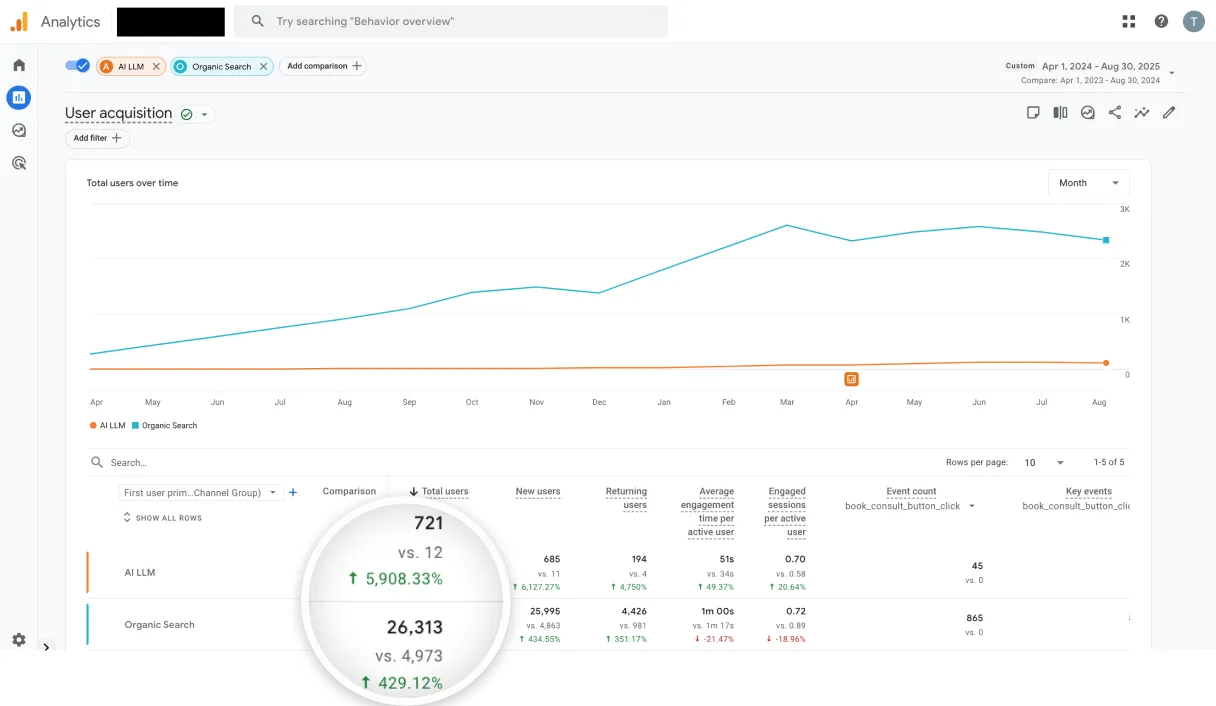
B2B AI SEO Case Study Overview
A B2B AI SEO case study demonstrates how strategic search optimisation drives measurable business outcomes for companies selling to other businesses. This case examines how Rankmax's AI-first SEO approach delivered transformative results for a property management outsourcing company, achieving 429% organic traffic growth and establishing dominance across both traditional and AI search platforms. Through strategic content creation, topical authority building, and early AI optimisation adoption, we generated $5.9M in revenue over 17 months.
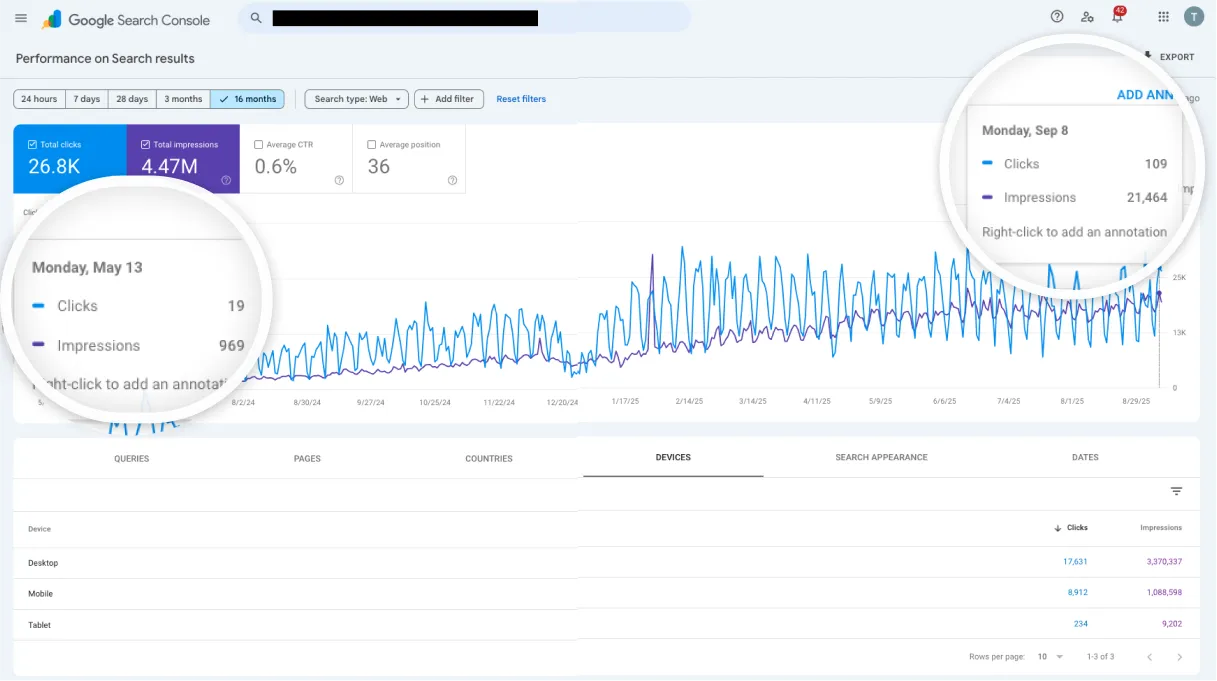
Performance Highlights
- $5.9M Revenue Generated: Opportunities directly attributed to organic search and AI LLMs
- 6,864% Average ROI: Returning $69 for every $1 invested in SEO
- 429% Traffic Growth: From 4,973 to 26,313 organic users in 17 months (April 2024 - August 2025)
- 138 AI Citations Achieved: From zero visibility to 115 Google AI Overviews, 12 ChatGPT, 10 Gemini, and 1 Perplexity citation
- 933% Market Share Increase: Organic search share of voice grew from 0.6% to 6.2%, overtaking the top competitor within 12 months
- 2,967 Keywords Ranking: Expanded from 162 to 4,947 ranking keywords (30.5x increase)
- 347% Increase in Referring Domains: From 19 to 85 high-quality natural referring domain backlinks without paid outreach or link building
The Challenge
Every successful SEO campaign starts with understanding exactly what's holding a business back from organic growth.
Before Rankmax: Organic Search Stagnation
When this property management outsourcing company approached us, they faced critical SEO challenges that threatened their growth targets despite offering superior services to competitors.
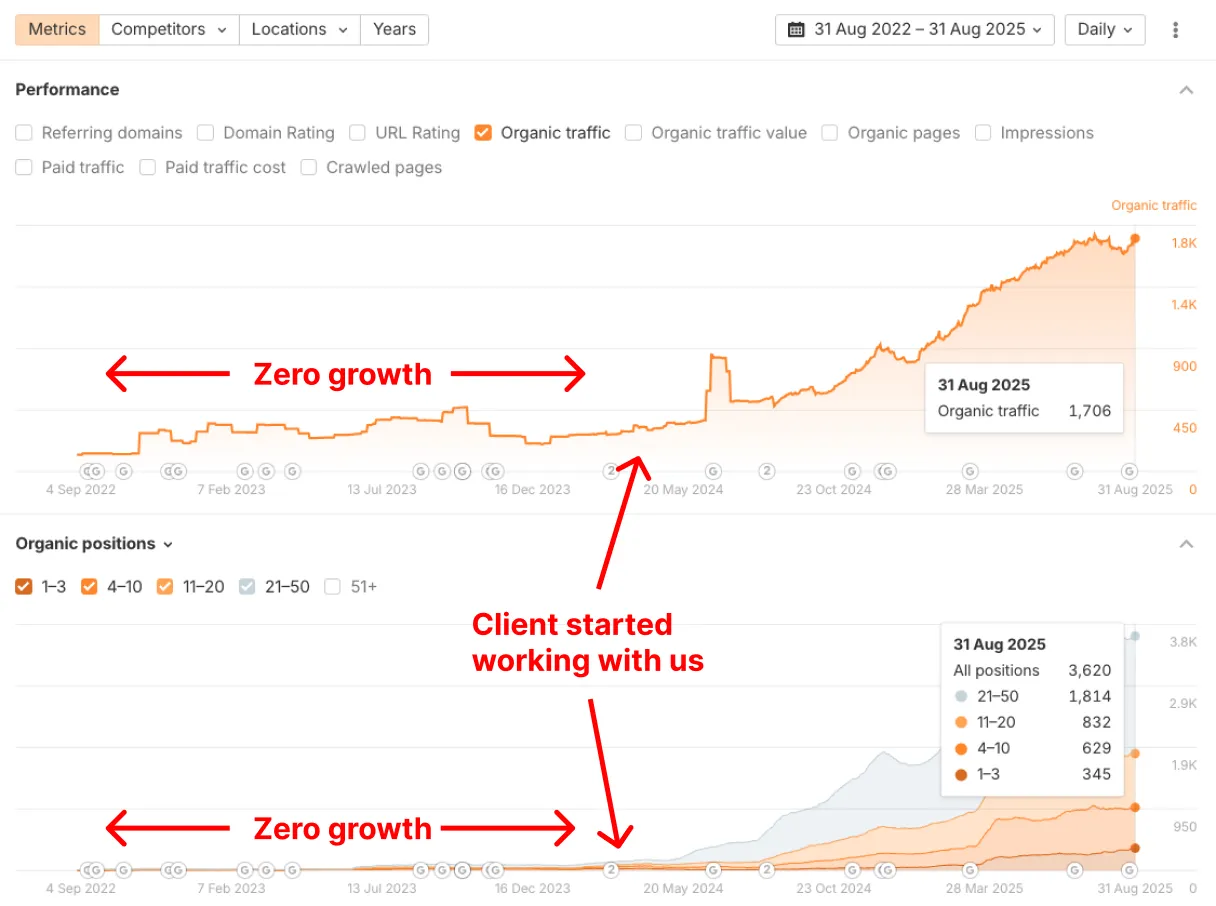
Search Visibility Crisis
Their organic presence was virtually non-existent where it mattered most. The numbers told the story: ranking for just 162 keywords total, with most positions beyond page three, where no one looks. Competitors owned the top positions, capturing all the high-intent traffic from property managers seeking outsourcing solutions.
Stagnant Traffic Growth
Despite being in the market for 7 years, their organic traffic had plateaued. They knew organic search produced ideal clients - property managers and real estate principals actively seeking solutions - but couldn't break through the competitive barrier their rivals had established.
Competitor Domination
One major established competitor controlled the entire search landscape. The market leader held a 15.4% share of voice, while our client sat at just 0.6%, meaning the competitor was 26 times larger in organic search visibility. Our client was essentially invisible to their target market, with the top competitor owning the majority of high-intent property management keywords.
Service Visibility Gap
The client's website failed to reflect the full scope of their outsourcing services. They offered dozens of specialised property management services but had fewer than half a dozen service pages published. This created two critical problems:
1. Limited Service Visibility
They lacked dedicated pages for most of their outsourcing services, making it impossible to rank for specific service-related searches. Potential clients searching for "property lease administration" or "real estate trust accounting" were unable to find them.
2. No Topical Authority
Without supporting informational content explaining their services in detail, Google couldn't establish them as an authority in property management outsourcing. They had service pages but no depth.

The Solution Required: Service Page Expansion + Content Clusters
We needed to build comprehensive service pages that accurately reflected the actual number of services provided, and then create informational blog content to support each service.
For example, we built a "Real Estate Lead Generation Outsourcing" service page, then followed up with a series of supporting blogs:
- Ultimate guide to lead generation for real estate
- Prospecting templates for real estate lead generation
- Checklists for real estate lead generation
- Top real estate lead generation tips
- Lead generation strategies for property managers
This pattern would be replicated across all major service categories, establishing both commercial intent pages and informational authority content.
Previous Short-Term Approach
The client had been hesitant to invest in an ongoing SEO campaign due to perceived expense. Instead, they'd played it safe with one-off, short-term SEO projects that gave quick ranking boosts but were soon lost due to aggressive ongoing SEO efforts from their top competitors.
This stop-start approach meant any gains quickly evaporated. What they needed was sustained, strategic investment that would compound over time.
Business Impact
The limited organic search presence directly impacted growth potential. They were missing out on qualified leads actively searching for property management outsourcing services. Worse, they were losing potential business to competitors who dominated organic search results for the exact services they provided.
The client already knew organic search produced ideal clients - their challenge was simply being found. To grow the business, we needed to dramatically expand their organic search visibility for relevant property management and real estate outsourcing keywords.
The Solution
Once we identified the gaps in their competitors' strategy and their own site limitations, the path forward became clear.
Our AI-First B2B SEO Strategy
We implemented a comprehensive three-pillar approach designed specifically for B2B buying cycles and AI search platforms.
Pillar 1: Strategic Foundation & Competitive Gap Analysis
Before scaling content, we needed to identify precisely where the opportunity existed. Our research revealed gaps in the top competitor's organic search strategy that we could exploit.
Keyword and Competitor Research
After clustering thousands of relevant property management keywords, we discovered we could rank for high-volume clusters of highly relevant terms where competition was surprisingly low - keywords the top competitor had missed entirely.
We prioritised these low-competition, high-relevance clusters first to establish strong topical authority and organic search signals quickly, before moving on to more competitive phrases that our competitors had long dominated.
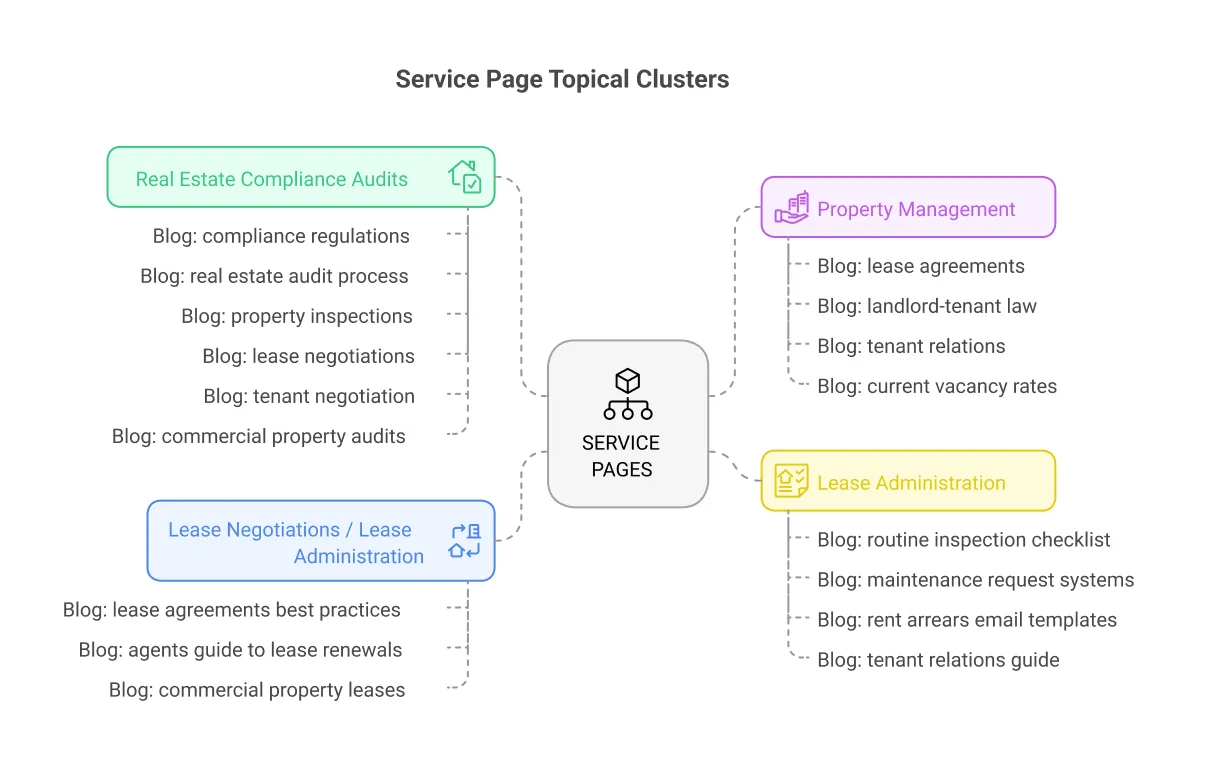
The Topical Authority Advantage
This approach aligned with confirmed Google Search algorithm signals around page-level topical authority. The Google Search algorithm documentation leak revealed that topical authority is indeed a ranking factor - pages demonstrating expertise across related topic clusters receive ranking advantages.
By building comprehensive content clusters around underserved property management topics, we can establish authority more quickly than by directly competing with head-on terms from day one.
Pillar 2: Authority Content Strategy
Rather than chasing volume, we focused on providing comprehensive resources that demonstrate deep property management expertise. Our content team developed service pages and blog posts targeting bottom and middle-of-the-funnel keywords relevant to property managers and real estate principals.
Leveraging First-Hand Expertise
Each piece heavily cited the client's published book, "From Stress to Success in Property Management". This enhanced E-E-A-T (Experience, Expertise, Authoritativeness, Trustworthiness) by demonstrating first-person subject matter expertise throughout the content.
When discussing property management systems, stress management for property managers, or operational efficiency improvements, we referenced specific chapters and insights from the client’s book. This wasn't just a citation for SEO - it was genuine expertise that competitors using generic content writers couldn't match.
We created dedicated hub pages for each major service category, building topical authority through interconnected content clusters. Every piece included proprietary insights from the client's 15+ years managing property portfolios, step-by-step implementation guides, and comparison tables addressing specific pain points property managers face.
Pillar 3: AI Search Optimisation
Recognising that 82% of enterprise SEO teams plan to increase AI investment, we positioned the client ahead of this shift. We restructured content for passage-level optimisation, ensuring key information appeared in featured snippet-friendly formats. Every page included FAQ schema markup targeting voice search queries. Content was written to answer questions the way users ask ChatGPT, not just how they search Google.
The Implementation
Strategy means nothing without execution - here's how we deployed our three-pillar approach across 17 months.
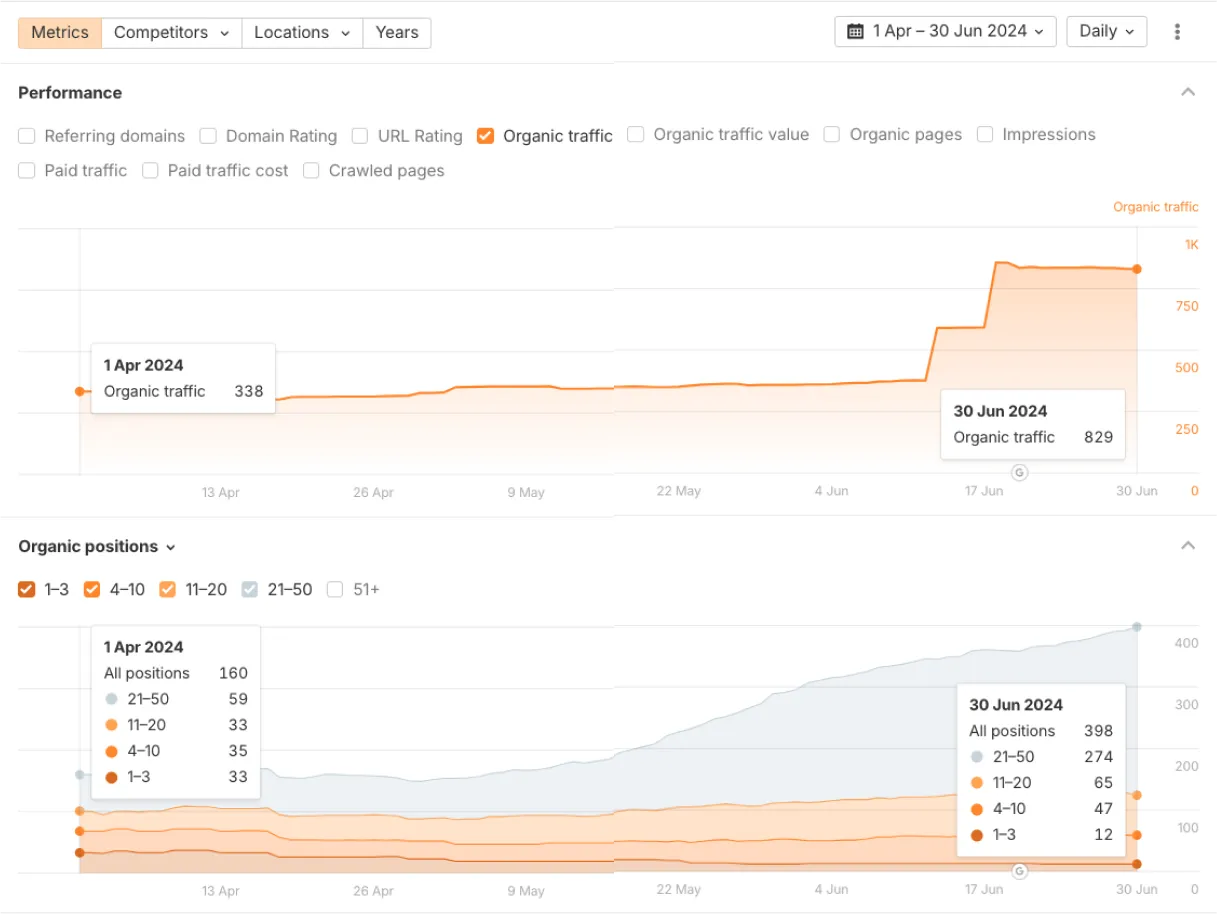
Month 1-3: Establishing Topical Authority Foundations
The first quarter required fighting on two fronts simultaneously: fixing critical technical debt while rapidly building content across underserved property management keywords.
The First Quarter Strategy:
We launched with strategic content targeting underserved property management keywords our competitor analysis had identified - low-competition clusters the market leader had missed entirely. Simultaneously, we addressed critical technical debt that was preventing content from ranking.
Starting from a 61 health score with 1,030 technical issues (including 229 critical errors), we systematically fixed broken links, compressed images, resolved HTTPS/HTTP conflicts, and eliminated orphan pages. By month three, the site achieved a 99 health score - technically superior to most competitors.
Content Focus:
Core service pages across social media marketing, photo editing, lead generation, and bookkeeping services formed the foundation. We then built supporting content clusters around real estate marketing, prospecting strategies, trust accounting, property maintenance, copywriting, newsletter strategies, and facilities management.
Each piece heavily cited the client's published book, "From Stress to Success in Property Management", establishing genuine E-E-A-T signals competitors couldn't match.
Quarter 1 Results:
The combination of technical excellence and topical authority delivered immediate traction:
- 669 new and improved rankings across three months
- Organic clicks increased 91% year-over-year by month two
- $179,910 revenue generated from $15,000 investment (1,099% average ROI)
- Average position improved from 47.9 to 39.5
More importantly, we established the foundation for exponential growth. With technical issues eliminated and strong topical authority in multiple service categories, we were positioned to scale aggressively into months 4-6.

Month 4-6: Content Acceleration & Service Expansion
With technical issues resolved and initial topical authority established, we launched our content offensive across all property management service categories.
Content Strategy:
The team published 12 pieces monthly, each targeting specific stages of the B2B buying journey. Topics were selected based on search intent analysis, competitive gaps, and sales team feedback about common objections property managers raised.
July-August 2024 Content Focus:
- Real estate reverse prospecting strategies and email templates
- Trust account management guides (templates, compliance)
- Newsletter content (ideas, strategies, ready-made templates)
- Social media marketing (Instagram posts, packages, influencer strategies)
- Video marketing and SEO for real estate
- Prospecting tools (software, platforms, calculators, conversion rates)
- Property management efficiency optimisation
- Virtual assistant training and services content
Each guide included executive summaries for C-suite readers, detailed implementation sections for operational managers, and clear ROI demonstrations showing business value.
Results Trajectory:
Traffic continued its compound growth pattern. The combination of technical excellence and comprehensive topical coverage meant new content ranked faster and higher than in previous months. Rankings that took 2-3 months to reach page one in April were now achieving page one positions within 3-4 weeks.
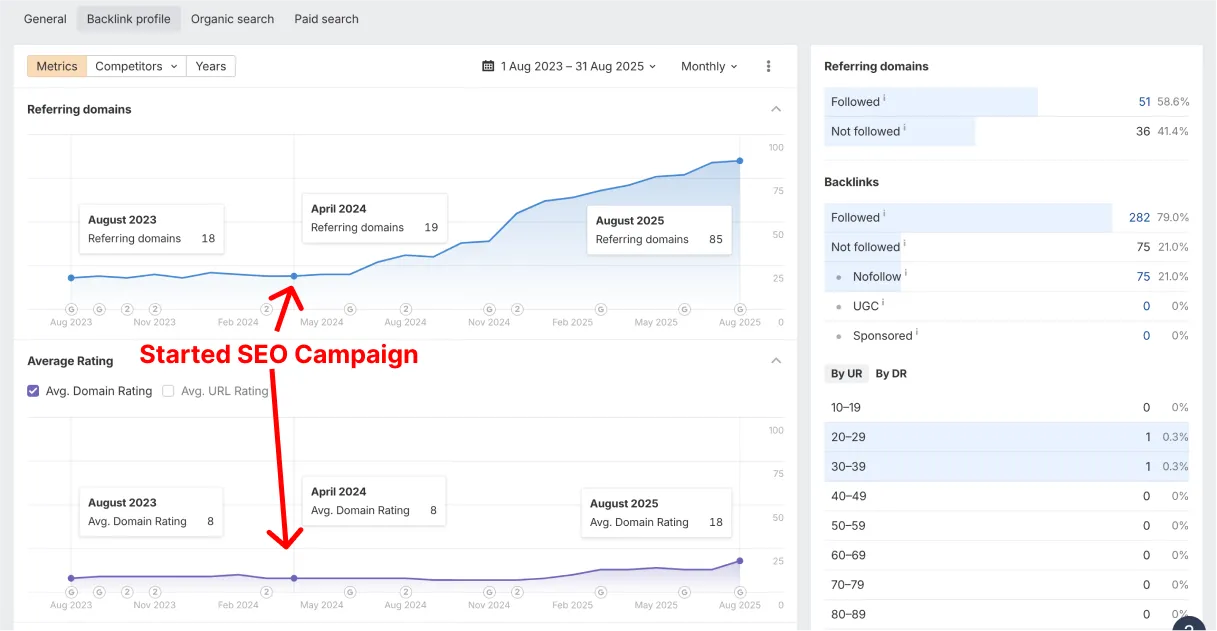
Month 7-9: Natural Link Building Through Content Quality
Strategic link building focused on quality over quantity. Rather than pursuing traditional outreach, we focused entirely on creating resources valuable enough to earn natural backlinks from industry platforms.
The Organic Growth Results:
Referring domains grew from 19 to 85 (347% increase) without a single outreach email or paid placement. This growth came entirely from industry websites, software platforms, and real estate publications discovering and linking to our content.
High-Authority Links Earned:
The backlink profile attracted links from highly authoritative domains:
- libsyn.com (DR 91): Podcast hosting platform linking to property management content
- jobstreet.com (DR 78): Job board linking to virtual assistant hiring guides
- rexsoftware.com (DR 73): Property management software provider
- nucamp.co (DR 69): Education platform
- eliteagent.com (DR 67): Real estate industry publication
- console.com.au (DR 61): Property management software platform
Why These Links Mattered:
These weren't typical SEO backlinks; they came from platforms that our target audience (property managers and real estate principals) actively use. A link from console.com.au or eliteagent.com carries relevance beyond just domain authority.
The 62 dofollow links (73% of the total) came from sites that genuinely found value in our property management guides, operational templates, and industry insights. This natural link acquisition pattern strengthened domain authority while building referral traffic from relevant sources.
September-October 2024 Content Expansion:
- Marketing packages and strategies for real estate agents
- SEO content (career opportunities, experts, keyword research)
- Comparative market analysis tools and templates
- Property management business development content
- AI for real estate marketing and lead generation
- Commercial real estate advertising and analytics
- Black and white real estate marketing strategies
- Transaction management and reporting software guides
Month 10-17: AI Optimisation and Market Leadership
The next 8 months concentrated on capturing AI search visibility while consolidating organic search dominance. Content was restructured to appear in Google's AI Overviews through specific formatting techniques.
AI-First Content Strategy:
We created content optimised explicitly for AI citation:
- Structured FAQ sections answering every variation of common questions
- Clear, concise definitions suitable for AI-generated summaries
- Step-by-step processes formatted for easy extraction
- Comparison content targeting "versus" and "alternative to" queries
- Natural language patterns matching conversational AI queries
November 2024-February 2025 Content:
- Property management income trust strategies
- Marketing yourself as a real estate agent guides
- Risks and strategies for poor marketing mitigation
- Do-it-yourself real estate trust account management
- Comparative market analysis complete guides
- Agency compliance and receipt trust models
- Real estate appointment setting and scheduling
- Social media content creation for property professionals
March-June 2025 Content:
- Marketing packages and strategies for developers
- Advantages of property management systems
- Commercial real estate advertising campaigns
- Black and white marketing effectiveness studies
- AI for real estate marketing implementation
- Marketing plan templates for sellers
- Lead generation marketing integration
- Self-promotion strategies for agents
July-August 2025 Content:
- Real estate reverse prospecting email templates
- Trust account compliance and reporting
- Newsletter strategies and implementation
- Social media Instagram post templates
- Video marketing and SEO integration
- Prospecting software and platform comparisons
- Property management efficiency maximisation
- Virtual assistant comprehensive service guides

AI Citation Breakthrough:
Google AI Overviews began citing the client's content within weeks of implementing AI-specific optimisation. By August 2025, the client had achieved:
- 115 Google AI Overview citations
- 12 ChatGPT citations when users asked about property management solutions
- 10 Gemini citations reaching Google's AI-first users
- 1 Perplexity citation in property management queries
This multi-platform visibility created an entirely new traffic channel that competitors hadn't yet recognised existed.
The Results
The true measure of B2B SEO isn't rankings or traffic - it's revenue impact and market position shifts.
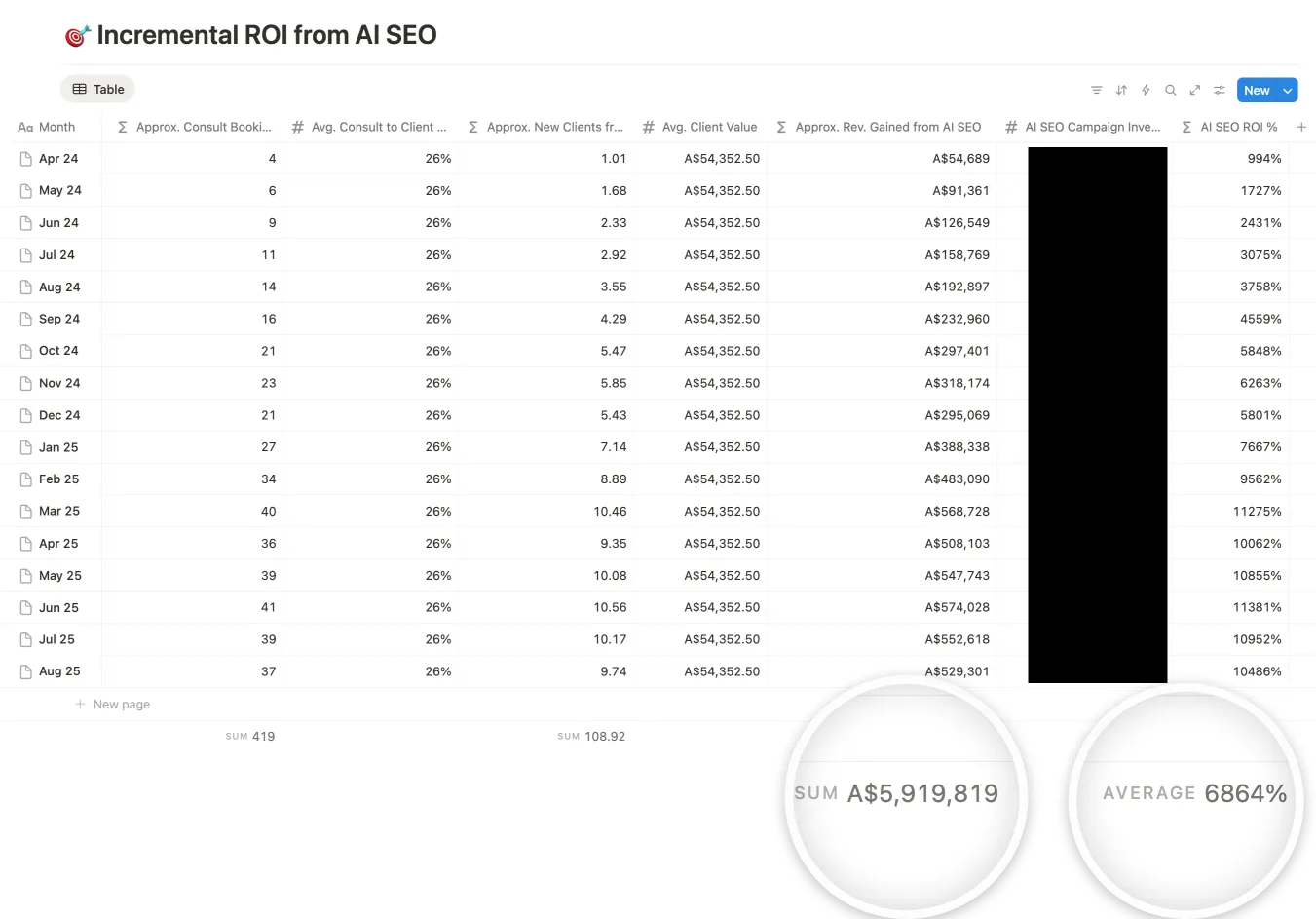
Revenue Impact and ROI
The true measure of B2B SEO success is revenue and sales pipeline impact:
- $5.9M in revenue generated from organic search and AI LLMs over 17 months
- 6,864x% average ROI - returning $69 for every $1 invested in the AI SEO campaign
- First month positive ROI - achieved 1,952% ROI in month one due to strong technical foundations
Monthly consultation bookings from organic search and AI LLMs grew from 4 to 40+. More importantly, the sales team reported these leads were better educated, further along in their buying journey, and more likely to close than leads generated through outbound prospecting.
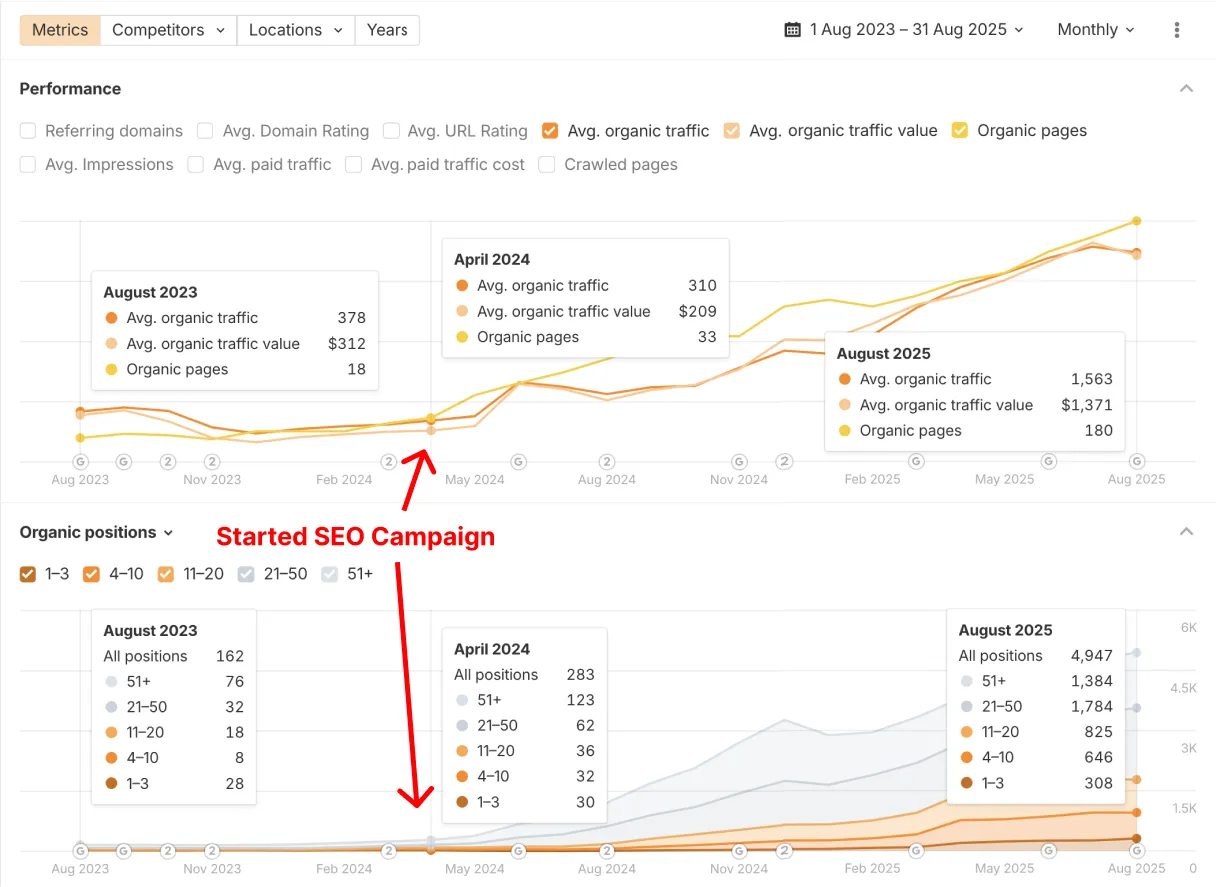
Traffic and Visibility Transformation
The numbers exceeded even our optimistic projections. Organic traffic soared from 4,973 to 26,313 users, a 429% increase that compounded over time. The growth wasn't linear - it accelerated as topical authority strengthened and more content clusters reinforced each other.
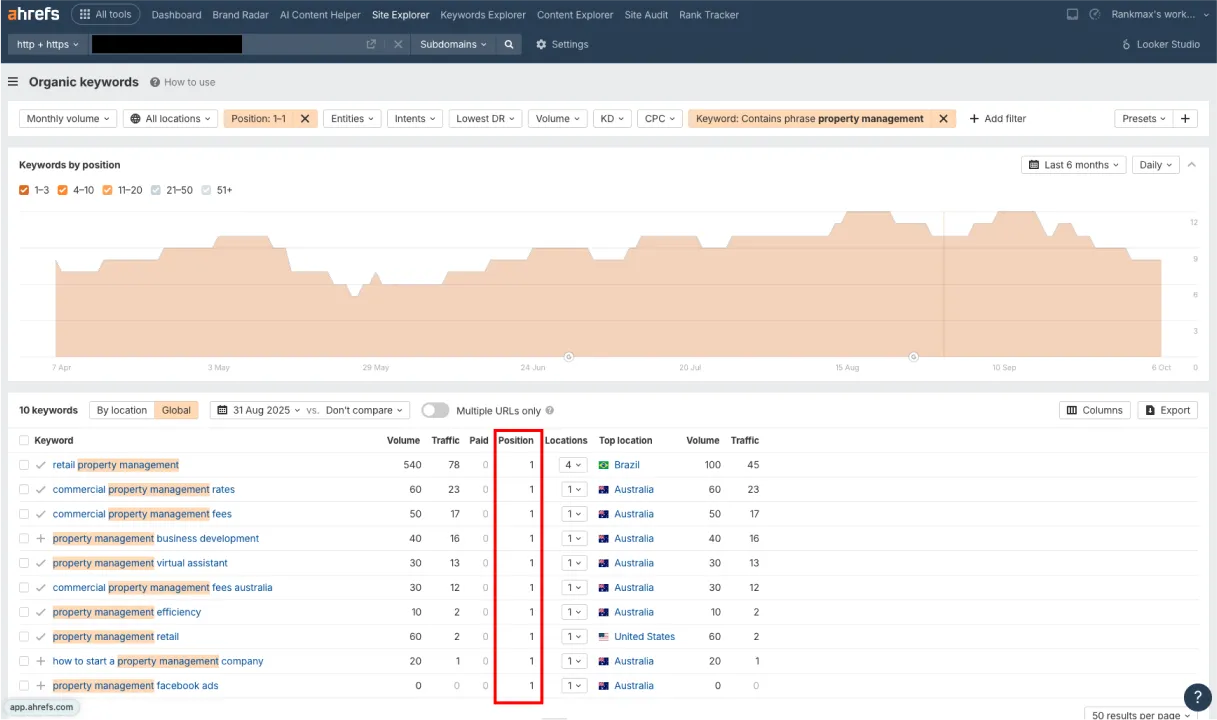
Keyword Domination Achieved
The keyword expansion transformed visibility. From ranking for just 162 keywords before working with us, the client now ranks for 4,947 terms - a 30.5x increase. Every targeted keyword aligned with the client's ideal customer profiles and service offerings.
High-Value Keyword Wins:
- retail property management: Position 1
- commercial property management rates: Position 1
- commercial property management fees: Position 1
- property management virtual assistant: Position 1
- commercial property management fees australia: Position 1
- property management efficiency: Position 1
These weren't vanity rankings - each keyword represented active searches from property managers and real estate principals looking for outsourcing solutions.

AI Platform Visibility Breakthrough
While competitors ignored AI search, we captured first-mover advantage across every major platform:
- Google AI Overviews: 115 citations (from zero)
- ChatGPT: 12 citations when users ask about property management solutions
- Gemini: 10 citations reaching Google's AI-first users
- Perplexity: 1 citation in property management queries
This multi-platform visibility created an entirely new traffic channel. 721 users arrived from AI platforms - a channel that didn't exist 12 months ago. More importantly, AI traffic converted at 6.24% (45 conversions from 721 users), proving these weren't just curious browsers but qualified prospects.
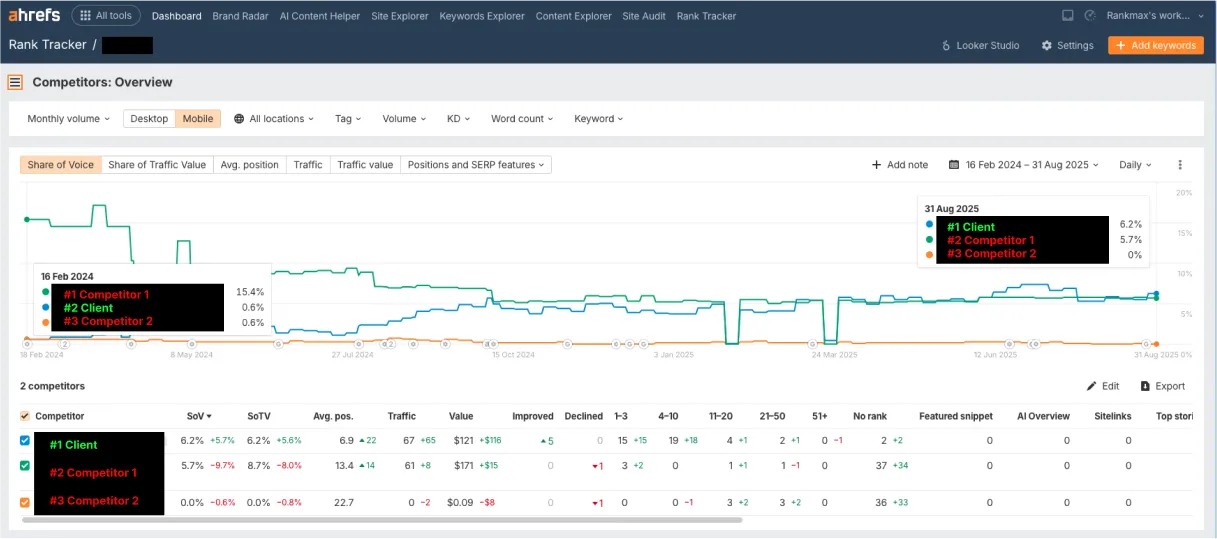
Market Share Reversal
The competitive landscape completely shifted. Our client's share of voice increased from 0.6% to 6.2% - a 933% rise that propelled them from invisible to dominant. They overtook the established competitor within 12 months of starting with us.
The previous market leader's share dropped from 15.4% to 5.7% as we captured their keywords. This wasn't luck - it was systematic targeting of their content gaps and technical weaknesses.
Key Learnings From This B2B SEO Case Study
Seventeen months of execution across technical optimisation, content creation, and AI integration revealed patterns that apply across B2B industries.
Technical SEO Remains Fundamental
The site had solid architectural foundations in place - mobile-first design, passing Core Web Vitals, clean semantic structure, and proper schema markup. However, years of content updates and platform changes had created significant execution issues that needed immediate attention.
When we started, the site had a 61 health score with 1,030 technical issues including 229 critical errors: broken internal links, HTTPS/HTTP conflicts, orphan pages, and 404 errors. These weren't architectural problems - they were accumulated technical debt from organic growth without ongoing maintenance.
The critical distinction: because the underlying architecture was sound, we could fix these issues quickly rather than rebuilding from scratch. We addressed:
- Mobile-first design: Already responsive and mobile-optimised
- Core Web Vitals: Clean code foundation, just needed image compression and file optimisation
- Semantic page structure: Proper H1/H2 hierarchy already established
- SEO-friendly schema markup: Organisation, LocalBusiness, Service, and Article schema already implemented
By month three, we'd eliminated technical barriers (health score 61 → 99), allowing content to rank on merit. This rapid technical improvement was only possible because we were fixing execution issues on a solid foundation, not rebuilding basic infrastructure.

This is why we achieved positive ROI in month one. Sites requiring complete architectural overhauls typically need 3-6 months of technical work before content can rank effectively. Sound foundations enable us to resolve issues in weeks, not months, freeing up budget for content creation and topical authority building.
Quality Beats Quantity in B2B Content
The days of 500-word blog posts are over. Our most successful content averaged 3,400 words, included original research and data, comprehensively answered 15-20 related questions, and featured interactive elements such as comparison tables and templates. One definitive guide outperforms 20 thin and loosely relevant articles every time.
AI Optimisation Is No Longer Optional
B2B buyers increasingly use AI tools for vendor research. Companies optimising for AI search see faster organic growth. Those ignoring this shift risk losing first-mover advantage to more agile competitors. This case achieved 138 AI citations while competitors had zero visibility in AI platforms.
Link Building Through Value Creation
We earned 66 referring domains without a single cold outreach email. The strategy was simple: create resources so valuable that links happen naturally. Our comprehensive property management guides, operational templates, and industry research earned backlinks from software platforms, industry publications, and educational resources that property managers actually use.
FAQs
How long does it take to see results from B2B SEO?
B2B SEO typically shows initial improvements within 3-4 months, with significant results by month 6-9. This case study achieved a 994% ROI in the first month, a 1,727% ROI in the second month, and a 2,431% ROI in the third month.
However, these results were only possible because the site's technical SEO foundation was already strong when we started. Sites requiring significant technical fixes before content can rank effectively should expect 2-3 months longer before seeing similar momentum.
Achieving market leadership and substantial revenue impact requires 12-18 months of consistent execution, regardless of technical starting position.
What's the difference between B2B and B2C SEO strategies?
B2B SEO focuses on longer buying cycles, multiple decision-makers, and higher-value conversions. Content must address various stakeholders, from technical users to C-suite executives. The emphasis is on thought leadership, demonstrating ROI, and building trust rather than achieving quick conversions.
How important is AI optimisation for B2B companies?
AI optimisation is becoming critical for B2B visibility. With B2B buyers starting their research independently, appearing in AI-generated answers captures early-stage researchers. This case study's 138 AI citations created an entirely new lead source that competitors haven't yet tapped.
AI traffic conversion rate was 6.24%, indicating that these users aren't just experimenting with AI tools - they're serious buyers using AI platforms for vendor research.
What metrics should B2B companies track for SEO success?
Beyond traffic and rankings, B2B companies should monitor revenue generated from organic sources, cost per acquisition from SEO, demo or consultation requests, content engagement rates, and multi-touch attribution throughout the buying journey. Evolve the SEO campaign strategy based on revenue and ROI impact, not vanity metrics.
How much should B2B companies invest in SEO?
For B2B companies serious about organic growth, start with a monthly minimum of $10,000 for a comprehensive SEO programme. At this investment level, you receive strategic content production, technical optimisation, keyword research, competitive analysis, and performance tracking. This isn't blog posts - it's a systematic approach to building topical authority and capturing high-intent search traffic from decision-makers.
Industry research confirms SEO content marketing requires an investment of anywhere between $9,000 to $90,000+ per month. The business case is straightforward: if your average customer value is $50,000 and SEO delivers 15 new customers annually, that's $750,000 revenue from a $120,000-$180,000 annual investment - a 317-525% ROI.
This case study achieved 6,864% average ROI across 17 months, returning $69 for every $1 spent. However, results like these require consistent execution over 12-18 months, not sporadic three-month projects.
Can SEO work for niche B2B industries?
Niche B2B industries often see better SEO results due to less competition and more specific search intent. The key is understanding your exact buyer's search behaviour and creating authoritative content on top of a technically sound website that demonstrates deep industry expertise.
What role does technical SEO play in B2B success?
Technical SEO is foundational for any B2B website. This case study's 429% growth started with ensuring the website was technically sound before scaling organic traffic. Without proper technical foundations—mobile optimisation, Core Web Vitals, clean code, and schema markup— even the best content struggles to achieve its full ranking potential.
How do you measure SEO ROI for B2B?
We use the standard marketing ROI formula: (Revenue Generated - Marketing Investment) / Marketing Investment × 100
We calculate ROI using incremental traffic and conversion rates based on actual real-world data. However, as an SEO agency, we cannot control or influence how much our clients spend to service a client. Therefore, we don't calculate ROI using profit margins.
All ROI calculations are sent to our client for review and approval each month to ensure we're not over-projecting the actual ROI and revenue generated. This collaborative approach ensures transparency and accuracy while acknowledging the limitations of agency-side revenue attribution.
Building Your B2B SEO Success Story
This B2B SEO case study proves that strategic SEO can transform B2B companies from invisible to inevitable. The property management outsourcing company went from stagnant to compounding growth, generating $5.9M in revenue while achieving 6,864% average ROI.
The formula is straightforward and replicable:
- Fix technical foundations
- Build topical authority through comprehensive content
- Optimise for AI search platforms
- Measure everything against revenue and ROI
However, as with anything as nuanced as AI SEO, the devil lies in the details. Companies that execute this playbook don't just improve rankings - they reshape competitive landscapes and build sustainable growth engines that compound over time.
The Results Summary:
- Revenue Impact: $5.9M generated over 17 months
- ROI Performance: 6,864% average return on investment
- Traffic Growth: 429% increase in organic users
- Market Dominance: 933% market share increase, overtaking an established competitor
- Keyword Expansion: 30.5x increase in ranking keywords
- AI Leadership: 138 citations across all major AI platforms
- Link Growth: 347% increase in referring domains through natural acquisition
- Technical Excellence: Maintained 98-99% health score throughout campaign
What The Client Had To Say:
"I've checked all the pages and they are all approved! Great work! I even got my first ideal client lead from Google this morning, representing 1200 properties! The 'Real Estate Virtual Assistant' content is excellent. It's great to see continued increases on our key words. Awesome work!
— Tiffany, Founder and CEO | ⭐⭐⭐⭐⭐ (5/5)
Ready to explore what strategic SEO could deliver for your business? Book a discovery call to discuss your organic growth potential - no obligations, just an honest assessment of whether our approach aligns with your growth targets.



AI Search Is Moving Fast. The Question Is - Are You?
Every month you wait, your competitors grow stronger. Let’s make sure you’re the one out in front.







